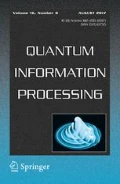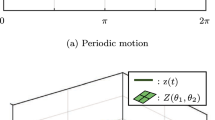Abstract
Time evolution of a quantum system is described by Schrödinger equation with initial pure state, or von Neumann equation with initial mixed state. In this paper, we estimate the error between the evolving states generated by two Hamiltonians with the same initial pure state. Secondly, according to the method of operator–vector correspondence, we give a relation of the Schrödinger equation and von Neumann equation and then estimate the error between the evolving states generated by two Hamiltonians with the same initial mixed state.
Similar content being viewed by others
References
Yajima, K.: Existence of solutions for Schrodinger evolution equations. Commun. Math. Phys. 110, 415–426 (1987)
Peskin, U., Moiseyev, N.: The solution of the time-dependent Schrodinger equation by the \((t, t^{^{\prime }})\) method: theory, computational algorithm and applications. J. Chem. Phys. 99, 4590–4596 (1993)
Bennant, M., Koslofft, R., Tal-Ezert, H.: Solution of the time-dependent Liouville-von Neumann equation: dissipative evolution. J. Phys. A Math. Gen. 25, 1283–1307 (1992)
Schiff, L.I.: Quantum Mechanics. McGraw-Hill Book Co., Inc, New York (1949)
Kato, T.: On the adiabatic theorem of quantum mechanics. J. Phys. Soc. Jpn. 5, 435–439 (1950)
Farhi, E., Goldstone, J., Gutmann, S., Sipser, M.: Quantum computation by adiabatic evolution (2000). arXiv:quant-ph/0001106v1
Farhi, E., Goldstone, J., Gutmann, S., Lapan, J., Lundgren, A., Preda, D.: A quantum adiabatic evolution algorithm applied to random instances of an NP-complete problem. Science 292, 472–476 (2001)
Zhang, D.J., Tong, D.M., Lu, Y., Long, G.L.: An alternative adiabatic quantum algorithm for the Hamiltonian cycle problem. Commun. Theor. Phys. 63, 554–558 (2015)
van Dam, W., Moscay, M., Vaziraniz, U.: How powerful is Adiabatic quantum computation?. In: Proceedings 2001 IEEE International Conference on Cluster Computing, pp. 279–287 (2002)
Ambainis, A., Regev, O.: An elementary proof of the quantum adiabatic theorem (2004). arXiv:quant-ph/0411152v2
Tong, D.M.: Quantitative condition is necessary in guaranteeing the validity of the adiabatic approximation. Phys. Rev. Lett. 104, 120401 (2010)
Wu, J.D., Zhao, M.S., Chen, J.L., Zhang, Y.D.: Adiabatic approximation condition (2007). arXiv:quant-ph/0706.0264
Cao, H.X., Guo, Z.H., Chen, Z.L., Wang, W.H.: Quantitative sufficient conditions for adiabatic approximation. Sci. China Phys. Mech. Astron. 56, 1401–1407 (2013)
Wang, W.H., Guo, Z.H., Cao, H.X.: An upper bound for the adiabatic approximation error. Sci. China Phys. Mech. Astron. 57, 218–224 (2014)
Yu, B.M., Cao, H.X., Guo, Z.H., Wang, W.H.: Computable upper bounds for the adiabatic approximation errors. Sci. China Phys. Mech. Astron. 57, 2031–2038 (2014)
Wang, W.H., Cao, H.X., Lu, L., Yu, B.M.: An upper bound for the generalized adiabatic approximation error with a superposition initial state. Sci. China Phys. Mech. Astron. 58, 030001 (2015)
Wang, Z.Y., Plenio, M.B.: Necessary and sufficient condition for quantum adiabatic evolution by unitary control fields. Phys. Rev. A 93, 052107 (2016)
Zhang, Q.: Quantum adiabatic evolution with energy degeneracy levels. Phys. Rev. A 93, 012116 (2016)
Sarandy, M.S., Lidar, D.A.: Adiabatic approximation in open quantum systems. Phys. Rev. A 71, 012331 (2005)
Arenz, C., Russell, B., Burgarth, D., Rabitz, H.: The roles of drift and control field constraints upon quantum control speed limits (2017). arXiv:1704.06289
Watrous, J.: Theory of quantum information. University of Waterloo, Ontario (2011)
Peres, A.: Quantum Theory: Concepts and Methods. Kluwer Academic, Dordrecht (2006)
Nielsen, M.A., Chuang, I.L.: Quantum Computation and Quantum Information. Cambridge University Press, London (2000)
Acknowledgements
This work was supported by the National Natural Science Foundation of China (Nos. 11771009, 11601300, 11571213) and the Fundamental Research Funds for the Central Universities (GK201703093).
Author information
Authors and Affiliations
Corresponding author
Rights and permissions
About this article
Cite this article
Wang, Wh., Cao, Hx. & Chen, Zl. Estimations of the errors between the evolving states generated by two Hamiltonians with the same initial state. Quantum Inf Process 17, 21 (2018). https://doi.org/10.1007/s11128-017-1772-y
Received:
Accepted:
Published:
DOI: https://doi.org/10.1007/s11128-017-1772-y



